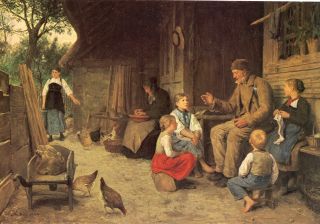Memory
Focus on What Is Important, to Be Efficient and Happy…
As we get older, we might just get better at knowing what is important to us
Posted June 25, 2013
We are often overwhelmed with information, things to do, and finding ways to balance our lives. Between the constant draw of our smart phones, endless internet searches, job responsibilities and family life, it can be difficult to find time to focus on what is important.

Overwhelmed? Does it get better with age?
The good news is that the ability to selectively focus on what is important allows us to function efficiently most of the time, and it can do more than that, as it can relax us and make us feel happier. In fact, one benefit of getting older is that this ability to selectively focus on important things may just happen naturally as we age…
Students of any age have many classes, and material to read, but how do we remember the important information? Often, when students come to my office hours (which they typically do right before an exam), the first question is, “What do we need to know for the test?” This is both a good question, and a hard one to answer: “You need to know the important things!” The challenge here is to know what is important. Some students highlight almost every other sentence in the textbook, showing that it is difficult to identify or know what is important. However, some of the best students seem to have this ability to first preview and then read (and re-read?) the important parts of the textbook, identify central themes of the lectures, and then extract and remember the important concepts.
As we get older, we may be better able to learn to selectively remember important information. Older adults (over the age of 60) typically experience a wide variety of memory changes, with the most pronounced changes being the decline in the ability to remember recently experience events and details. However, older adults may be MORE aware of these taxes on their memory capacity, and as a result, can selectively focus on important information. In experiments where people are asked to remember words paired with higher and lower point values (and thus some words are more important to remember), younger adults (around the age of 20) remember more words overall relative to the older adults. However, there are no age differences for the highest valued (most important) words. This result is due to older adults selectively focusing on these higher-value words, and spending more time studying them, at the expense of the less important information (for a recent study, see Castel et al., 2013). Thus, despite remembering less, older adults can remember the important information, possibly by using strategies that help selectively focus on this important information.

Albert Anker’s “Grandfather Tells a Story”
Imagine you have to memorize an interesting but lengthy story to later tell to a young child. How well would you be able to remember the story, as well as tell it so that the child would understand it? A study examined this issue (see Adams et al., 2002) and found when asked to later tell a newly learned story to a six year old child, an older adult will shorten and modify the lengthy story to selectively emphasize the important parts and emotional content, change some of the wording and paraphrase long passages, such that child will have a better understanding of what is happening in the story. However, younger adults will more accurately recall the entire story (with all of the details), but often fail to modify it such that it is understandable for a younger audience. This is an example of how older adults might be good “memory editors”, by modifying things to emphasis the important parts (possibly by excluding or forgetting irrelevant details), and making sure the listener can follow along. Maybe that is why certain grandparents are often the most revered storytellers? (see Albert Anker’s “Grandfather Tells a Story” painting for a historical example)
So how can this make us happier? As we get older, our goals in life may shift: in our early adulthood (perhaps our 20s), we focus on “information gathering” (such as learning information for a class or job), whereas as we get older (in our 60s and beyond), we tend to focus on more emotionally-meaningful goals, perhaps because when we are older we can better appreciate that life is short. This is known as socioemotional selectivity theory, developed by Laura Carstensen and colleagues at Stanford University. This theory has been demonstrated when people of different ages view different types of advertisements. When thinking about purchasing a new camera, younger adults prefer ads that emphasize exploring new adventures, whereas older adults prefer ads centered on capturing those special moments. There are also studies showing that older adults prefer to spend time with emotionally-meaningful family and friends, over novel acquaintances, whereas younger adults prefer the novel people.
The more mature mind is a better emotional regulator (perhaps not a surprise to any parent with young or teenage children?!), and often can manage emotional reactions and contemplations in a calm and responsive manner. As we get older, we tend to focus on happier, more positive information, and do not dwell on negative events. As a result, older adults tend to be happier than younger adults (and in terms of healthy aging, actually experience less depression relative to younger adults). There is also a study showing that episodes of sadness/negative mood are shorter lived in older adults than in younger adults, as older adults are better regulators of emotion. This may come as surprise to many who think that aging is all downhill…perhaps as we get older, we are better at knowing what is important in life, and focusing on the important things!
So, what do you remember as being important from this message? Try to summarize the important things, and go tell a friend...it will help you remember it better!


